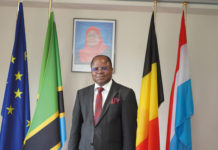Much has been written about the South African economic difficulties of the past decade, from record unemployment to the corruption scandals that have marked President Zuma’s era. Today, the re-election of former businessman Cyril Ramaphosa as head of the country raises hope for recovery. And seems to sign the end of the investment strike.
It was claimed that the South African economy in tatters. Of course, the challenges inherited from the Zuma presidency (2009-2018) are serious. In 2018, the latter left his successor a country weakened by corruption and mass unemployment (over 27%), a declining mining sector and a serious budget deficit with weak growth, in a context of exacerbated social inequalities. However, since May 8, a wave of optimism is washing over the South African state.
The hunt for corruption is on
Recently re-elected, President Cyril Ramaphosa has made economic recovery a priority. Focused on growth and employment, its program focuses on investment, particularly foreign investment (FDI), to get out of the crisis. The reforms undertaken during his previous mandate (mining charter, visa facilitation, etc.) and the start of the fight against corruption (commissions of inquiry, skimming of ministers) have already stimulated a gradual recovery in investor confidence.
Boosting entrepreneurship: the expected projects
According to the OECD (Economic Outlook 2019), structural reforms are expected to remove barriers to entrepreneurship and stimulate competition, thereby increasing job creation. According to the OECD report, the uncertainties surrounding land reform that would allow expropriations without compensation should soon dissipate. Cyril Ramaphosa’s campaign was also intended to be reassuring for the white community:
it would ensure that the economy would not be disrupted, i.e. that active farmers would not be expelled.

On the other hand, the issue of power cuts and shortages continues to worry. It is one of the priority concerns of the re-elected President, who announced the restructuring of Eskom – which has been bailed out many times – as well as other public companies plagued by corruption and mismanagement.
A powerful and attractive economy, the most diversified on the continent
Despite its difficulties, South Africa remains one of the continent’s major economic powers, neck and neck with Nigeria for first place. With 75% of the largest African companies, it is the only African country member of the G20 and BRICS. As for the business climate, South Africa has little to be ashamed of in comparison with its neighbors: in 2019, it remains ranked as the 2nd most attractive country in Africa for investors by the Rand Merchant Bank (RMB), and 6th on the continent in Doing Business.

Considered one of the most promising emerging markets, South Africa has more than one way to attract investors: successful industrialization, a highly developed and efficient services sector (especially financial), a frank opening to exports, etc. And while it boasts an immense wealth of natural resources (coal, platinum, gold, etc.), it is less dependent on mining revenues than its counterparts:
its economy is the most diversified and among the most modern on the continent.
Privileged areas for private investors
To promote industrialization and address some social challenges, the South African government has defined a series of nine special geographical areas for priority economic development (SEZs). Launched in 2016, this program aims to attract foreign direct investment (FDI) to promote growth and competitiveness and job creation.
To date, SEZs have already attracted 11.6 billion rands of private investment!
The majority of these areas are dedicated to a specific industrial sector to stimulate the development of groups of suppliers and service providers. For President Ramaphosa, the aim is to concentrate industrial value chains there to foster collaboration and reduce costs. In these SEZs, economic and trade rules differ from those prevailing in the rest of the country. In concrete terms, these areas offer a series of incentives and tax benefits for private investment, which are likely to evolve:
- 15% preferential corporate tax rate
- Suspension of VAT and customs duties in areas under customs control
- Employment incentives
- Construction allowance
- Preferential land and utility rental rates
![]()
More information on:
www.investsa.gov.za/special-economic-zones
![[:en]RAINBOW[:]](https://perspectives-cblacp.eu/wp-content/uploads/2019/09/RAINBOW-696x464.jpg)


